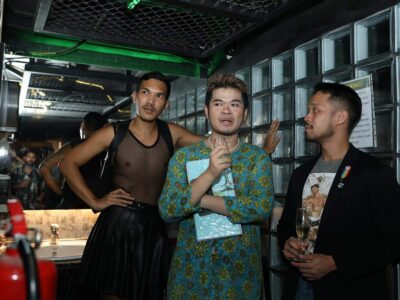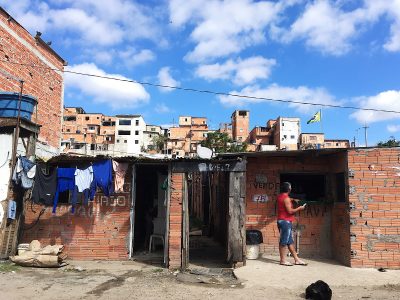
Una scena del film “The Teacher” (l'insegnante) con il personaggio principale Kevin e sua madre. Foto fornita da Swallow wings, usata con permesso.
Un film taiwanese, recentemente rilasciato e già premiato, mette alla prova i limiti di accettazione verso le persone LGBT, poiché il paese è diventato il primo in Asia ad approvare una legge sui matrimoni gay nel maggio 2019.
The Teacher (我的靈魂是愛做的) [zh] è un film del taiwanese Ming Lang Chen che ha appena vinto un premio a novembre al Golden Horse Festival 2019 [en, come i link seguenti, salvo diversa indicazione], il più grande e antico festival cinematografico nel mondo di lingua cinese. Racconta la storia di un giovane insegnante di scuola omosessuale che si confronta con la sua famiglia, i colleghi e l'amante mentre lotta per rendere trasparente la sua identità di genere e accettata dalle persone che lo circondano. Il film esce ufficialmente il 6 dicembre ed è il secondo lungometraggio di Chen: nato a Taiwan nel 1970, ha lavorato come tenente nell'esercito taiwanese prima di emigrare a New York, dove ha completato i suoi studi presso il dipartimento cinematografico all'università di New York. Il suo primo lungometraggio, Tomorrow Comes Today (你的今天和我的明天) [zh], è uscito nel 2003 e racconta la storia di un migrante taiwanese a New York che sta esplorando la sua mascolinità.
Chen trascorre la maggior parte del suo tempo a New York, ma viaggia regolarmente a Taiwan. Chen ha accettato un'intervista mentre era in tournée a Taiwan per il debutto del suo film “The Teacher”.
Filip Noubel: Cosa ti ha ispirato a girare il film “The Teacher”(我的靈魂是愛做的)?
Ming Lang Chen: My initial idea was to make a movie about a gay couple in which one is HIV positive, and the other isn't. Eventually, the story evolved, and I decided to make the movie in Taiwan. The main plot follows Kevin, a 26-year-old high school teacher who teaches civic education in Taiwan. He falls in love with a another man, and discovers two things about him later: That this man is married to a woman and that he is HIV positive. Kevin is thus faced with a number of challenges: He has to face his own mother with whom he still lives and with whom he talks about the man he loves; then there is the fear of AIDS, and finally he also needs to face his lover's wife. On top of that, someone spreads a rumor at his school that he is HIV positive. The school then tries to force him to resign, as it is illegal to fire someone based on their HIV status in Taiwan. So the main theme is really how one faces pressure at a rather young age. The Teacher is about human communication, it shows a wide range of delicate emotions, I wouldn't say it is just a gay movie.
Ming Lang Chen: La mia idea iniziale era quella di fare un film su una coppia gay con uno affetto da HIV e l'altro no. Alla fine la storia è stata elaborata e ho deciso di girare il film a Taiwan. La trama principale segue Kevin, un insegnante di scuola superiore di 26 anni che insegna educazione civica a Taiwan. Si innamora di un altro uomo e scopre due cose su di lui: che quell'uomo è sposato con una donna e che lui è sieropositivo. Kevin affronta di conseguenza una serie di sfide: deve affrontare sua madre con cui vive ancora e con chi parla dell'uomo che ama, e poi c'è la paura dell'AIDS e finalmente anche lui deve affrontare la moglie del suo amante. Come se non bastasse, qualcuno diffonde pettegolezzi nella sua scuola dicendo che lui è sieropositivo. Allora la scuola lo obbliga a dimettersi, dato che è illegale licenziare qualcuno basandosi sullo stato di malato di HIV a Taiwan. Quindi, il tema principale è veramente come una persona affronta pressioni a un'età piuttosto giovane. Il film (The Teacher) è sulla comunicazione umana, mostra un'ampia serie di emozioni, non lo definirei come un film gay.
FN: Perché pensi che il tuo film abbia vinto un premio al Gold Horse Award 2019?
MLC: Taiwan is very friendly towards LGBT film production. Every year the the Golden Horse Award, which started in 1962, has at least one or two LGBT-themed movies competing for an award. In 1993, the gay-themed movie Wedding Banquet by Taiwanese and now global filmmaker Ang Lee won the award for best feature film. In 2003, a serial adaptation of Crystal Boys (孽子), inspired the groundbreaking gay novel of the same name by Taiwanese gay author Pai Hsien-yung (白先勇) won the Golden Bell Awards.
As for Winnie Chang, who plays the wife in my film, I believe she won the Best Supportive Actress Award because, even though there are very few scenes involving her, she represents the many layers of this typical situation when gay men marry women out of social and family pressure. She finds herself in a love triangle that was not her choice and is exposed to a lot of pressure. She married into a big family, has to keep up appearances, wants a child and is pressured by her in-laws to do so. Yet she remains tolerant and humane.
MLC: Taiwan è molto accogliente nei confronti della produzione dei film LGBT. Ogni anno il Golden Horse Festival [it], che è iniziato nel 1962, ha almeno uno o due film a tema LGBT in competizione per un premio. Nel 1993, il film a tema gay il banchetto di nozze [it] del regista taiwanese ora globale Ang Lee [it] ha vinto il premio per il miglior film. Nel 2003 un adattamento seriale di Crystal Boys (Il maestro della notte) [it], ha inspirato l'innovativo romanzo omosessuale dell'autore gay taiwanese Pai Hsien-yung vincendo ai Golden Bell Awards.
Per quanto riguarda Winnie Chang, che interpreta la moglie nel mio film, credo abbia vinto il premio come miglior attrice non protagonista [zh] perché, anche se ci sono pochissime scene che la coinvolgono, rappresenta molti strati di questa situazione tipica quando gli uomini gay sposano donne per pressione sociale o familiare. Si trova in un triangolo amoroso che non era sua scelta ed è esposta a molta pressione. Si è sposata in una grande famiglia, deve mantenere le apparenze, vuole un figlio ed è sotto pressione dei suoceri per farlo. Eppure rimane tollerante e umana.

Una scena del film “The Teacher” con Winnie Chang, che ha vinto il premio come la migliore attrice non protagonista ai Golden Horse Awards. Foto fornita da Swallow wings, usata con permesso.
FN: Taiwan è spesso descritta come un'oasi per i diritti LGBT nell'Asia orientale. È vero o si applica a tutta la società taiwanese?
MLC: In the capital Taipei, we live in a very open space, we have a large Gay Pride Parade, and so we tend to think that being gay is no big deal. But we need to get outside of this bubble and see what is really happening in society. Because yes, Taiwan is a democracy, but a very young one, just in its early 30s. This is why I chose a main character who is just under 30. I wanted to see what this generation is experiencing, as they are the first to grow in a post-martial law society.
This is why the movie will be distributed across Taiwan in 16 commercial movie theaters. We didn't want to go big and end up with half-empty movie theater rooms. This is an art movie, quite different from Taiwanese mainstream movies that are heavily influenced by the storytelling of TV series. Our hope is that word of mouth will convince audiences who are into indie movies to come and appreciate The Teacher.
MLC: Nella capitale Taipei viviamo in uno spazio molto aperto [it], abbiamo una grande sfilata del Gay Pride, quindi tendiamo a pensare che essere gay non sia un grosso problema. Ma dobbiamo uscire da questa bolla e vedere cosa sta realmente accadendo nella società. Perché sì, Taiwan è una democrazia, ma molto giovane, nei suoi primi anni 30. Questo è il motivo per cui ho scelto un personaggio principale che ha poco meno di 30 anni. Volevo vedere cosa sta vivendo questa generazione, poiché sono le prime a crescere in una società di diritto post-marziale.
Questo è il motivo per cui il film sarà distribuito in tutta Taiwan in 16 cinema commerciali. Non volevamo andare alla grande e finire con sale cinematografiche semivuote. Questo è un film d'arte, abbastanza diverso dai film tradizionali di Taiwan che sono fortemente influenzati dalla narrazione di serie TV. Ci auguriamo che il passaparola convinca il pubblico a cui piacciono i film indie a vedere il film ed ad apprezzarlo.

Il regista Ming Lang Chen (a destra) al debutto di “The Teacher” a Taoyuan, con una fan e l'attore principale Oscar Chiu (邱志宇) (a sinistra). Foto di Filip Noubel, usata con permesso.
FN: Chi si oppone allora ai diritti LGBT a Taiwan oggi?
MLC: The strongest opposition comes from certain members of religious groups, and mostly Christian people. They have money, are influenced by groups outside of Taiwan, and have a blind belief that homosexuality is wrong, even though the Bible doesn't say that. But there is also another factor: our Asian traditions that keep any talk about homosexuality hush hush. The result is that very few people come out, so people don’t get to see or know a gay person in their immediate circles. That's what I wanted to achieve with Kevin; to introduce a person who looks like a neighbour so people can look at his dilemma and say: “I know him!”.
I couldn't imagine that I would see marriage-equality happen in Taiwan, and we have to thank people like Chi Chia-wei who were brave enough to come out publicly. I never felt prouder to be a Taiwanese than the day we passed the marriage equality law.
MLC: L'opposizione più forte viene da alcuni membri di gruppi religiosi e soprattutto dai cristiani. Hanno soldi, sono influenzati da gruppi al di fuori di Taiwan e credono ciecamente che l'omosessualità sia sbagliata, anche se la Bibbia non lo dice. Ma c'è anche un altro fattore: le nostre tradizioni asiatiche continuano a parlare di omosessualità in segreto. Il risultato è che pochissime persone si dichiarano tale, quindi le persone non riescono a vedere o conoscere una persona gay nelle loro cerchia di conoscenti. Era quello che volevo ottenere con Kevin, ovvero presentare una persona che assomigli a un vicino in modo che la gente possa guardare il suo dilemma e dire: “Lo conosco!”.
Non potevo immaginare che avrei visto i matrimoni gay accadere a Taiwan e dobbiamo ringraziare persone come Chi Chia-wei che sono state abbastanza coraggiose da uscire pubblicamente. Non sono mai stato più orgoglioso di essere un taiwanese rispetto al giorno in cui abbiamo approvato la legge sui matrimoni tra persone dello stesso sesso [it].






